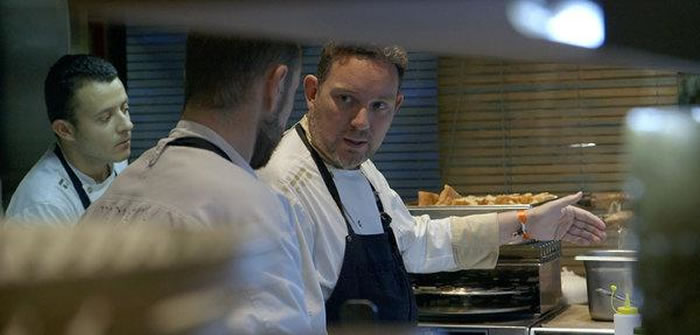Filmmakers Laura Collado and Jim Loomis’ Constructing Albert, a release from Juno Films,follows Albert Adrià as he brazenly launches five different restaurants in Barcelona from 2013 to the end of 2016, hoping to forge his own food empire and get out of the shadow of big brother Ferran, the wunderkind behind Spain’s world-class eating mecca elBulli.
While this culinary-themed doc offers a little kitchen sizzle and artistically plated tastings (a delicious shrimp dish sautéed, a daring soy sorbet, etc.), the film has more of a scattershot, look-at-me Facebook feel. We experience Adrià onscreen or via voiceover as he nonstop shares—whether with journalists, colleagues or the camera—his personal and professional views. He thus reveals how driven he is by ambition, creativity and the need to be a culinary great. There are also some philosophical and psychological tidbits thrown in (e.g., a chef’s compulsion must be to delight diners with food; when in trouble, always smile, as “that works”).
Albert is seen as a single-minded engine always on the go. He believes in a strong team and can be tough with staff. On the tender side is very touching footage of when Albert missed the birth of his son, who arrived prematurely because Dad was involved in readying a restaurant. (The boy is also shown more recently as absolutely adorable.) And in a barber’s chair while his slightly graying hair is cut, Albert betrays that very human distaste for aging.
Like a Facebook posting, Constructing Albert has the wafting, slightly off aroma of self-promotion. This is further spurred by reports of a large Spanish food hall-cum-restaurant complex to arrive next year in lower midtown Manhattan’s emerging vast Hudson Yards industrial complex. This new venture is a collaboration of the Constructing Albert co-stars—the Adrià brothers and their pal José Andrés, the D.C.-based, world-class restaurateur and food celebrity who helped popularize high-end tapas stateside.
Ferran shows up often and even in a flashback visit to elBulli, when, at its peak, it closed as arguably the world’s most famous yet out-of-the-way restaurant far from Barcelona. Andrés also pops up frequently. Neither is identified with a title; such is their fame. Local Adrià colleagues, most working Albert’s new establishments, have lesser roles.
Much of the doc concentrates on the creation of Albert’s Barcelona restaurants, of which he’s more creator/owner/manager than on-site chef, although it’s noted that at one point he was visiting five kitchens in one day. (That’s a lot of heat to take.)
The restaurants include Tickets, which seeks to provide fun in bringing tapas to haute cuisine status; the nearby 41°, which, conceived as a mini elBulli, serves each diner 41 different small dishes of more experimental food for a more “emotional” experience; Pakta, a Japanese-Peruvian fusion place reflecting a good portion of Peru’s population and meant to “surprise” patrons. Also given more screen time is Enigma, Albert’s most ambitious project, which he calls “the cherry on the cake.” There’s also Bodega1900, Albert’s homage to Catalan vermouth culture, and Hoja Santa, an immersion into traditional Mexican that apparently didn’t fare as well as the others, some of which already have their Michelin stars.
The doc follows Albert as he constructs and helps us deconstruct who he is, including ego-revealing observations that have him musing about being primarily guided by instinct. Beyond his apparent 25 years behind the scenes at elBulli, little biographical information emerges. While the Adrià cuisine is haute, the brothers’ lower-class Barcelona background is reportedly not so—a sometimes harsh, cursing Albert provides hints of this.
While short of Cain-and-Abel drama, the doc has Albert proclaiming that while Ferran is the Mt. Olympus of chefs, “Why not me?” Above all, he wants to emerge from the shadows, where he was a force in elBulli’s research and development efforts. The result was a culinary revolution that, with its new techniques, broadened diners’ notions of what food and the dining experience could be.
The doc’s motors are fueled by Albert’s ego and determination, making this more a study of an alpha-grade man than how to build a top-grade restaurant. He characterizes his Barcelona projects as “being like a film director making five genre films.” It does take an “action” star like Albert, but there are no studio suits to toady to. “It is a necessity; I need to express myself,” he says of his mission.
Yes, there are morsels here in a potluck kind of way that will appeal to foodies, restaurant stalkers, gastronomes and the like. Though more familiar food-porn ingredients are pushed to the back burners (no recipes, no prep tips, no culinary hints), the hyper-energetic, forthcoming Albert, his dedicated entourage, and the hustle-bustle of Barcelona and his quintet of restaurants might sate other filmgoer appetites.
By: Doris Toumarkine for Film Journal International

